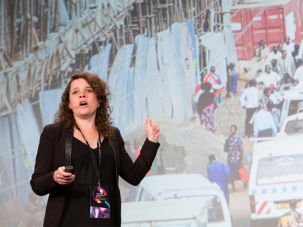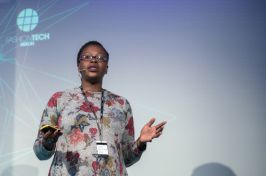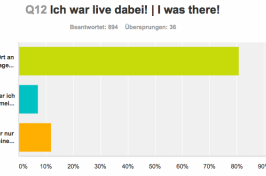Collect data and process it so that it benefits everyone: Data activist and civic tech expert Sarah Williams showed us how in "Big Data for a Public Good – Design our Urban Future with Civic Tech" on the mainstage. She presented different big data projects from the Civic Data Design Lab of the Massachusetts Institute of Technology (MIT) at the re:publica.
Huge open data sets, known as Big and Open Data, are being demanded by a growing number of net activists to help promote transparency. But what these demands should not neglect is that the data needs to be processed properly to be available and usable for everyone.
An excellent example of this is the "Digital Matatus Project" in Nairobi, which Sarah Williams highlighted in her talk. Matatus are small shared taxis and busses and constitute the most important mode of transportation in the Kenyan capital. The only problem until now: There was no overview of the Matatu routes. It was hard for people to find out which Matatus were heading where. There had already been some public data, but it was hard to access and was usually poorly prepared.
The university in Nairobi therefore wanted to create a stylised map of the city's Matatu routes in cooperation with the MIT Civic Data Design Lab. To be able to document all the stretches, the research team collected all the routes and stops with the help of the government, the population and the drivers. The data was formatted into GTFS – data structures that make up the basis for route planner apps like Google Maps. Kenyan programmers were then able to create multiple route planner apps with the data.
In addition, the researchers also designed a map similar to that of German U-Bahn maps. The different routes are clearly depicted and grouped by colour depending on what direction they travel. This map format was subsequently taken on by the city of Nairobi.
The MIT Civic Data Design Lab carried out further data projects in New York City and China: In New York, and on behalf of the American government, the team calculated the way to work for tailors in the New York fashion industry. In China, the team was able to identify the empty satellite towns, known as "Ghost Towns", by comparing the social media activities in the individual regions with each other.
The important factor with all these types of projects is the communication with the government, the population and non-governmental organisations. This is because it is only possible to collect comprehensive data and develop useful application scenarios when none of these groups are excluded.
Image: re:publica/Jan Zappner (CC BY 2.0)





